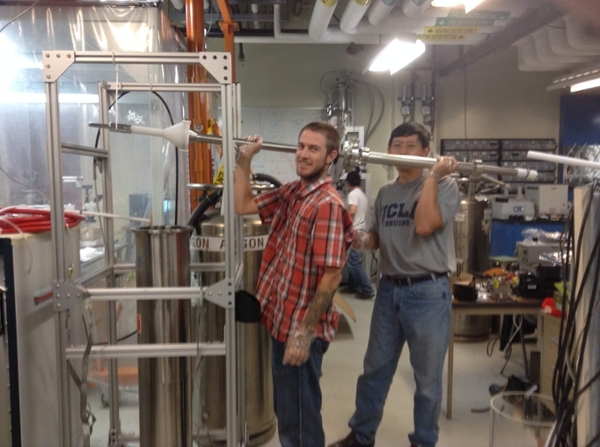Alumni Highlight

Andrew Renshaw
After graduating from Cal Poly in 2008 I immediately started graduate studies at UC Irvine, where I studied solar neutrinos at Super-kamiokande under Prof. Henry Sobel, the US spokesperson of the experiment. A previous Japanese spokesperson of Super-Kamiokande, Takaaki Kajita, was awarded a share of the 2015 Nobel Prize in Physics for the contributions of Super-Kamiokande to the field of neutrino oscillations and mass. I finished my thesis analysis "First Direct Evidence for Matter Enhanced Neutrino Oscillation, Using Super-Kamiokande Solar Neutrino Data" and graduated with a PhD in physics. After sticking around UCI to continue work on Super-K and an R&D project called EGADS that was aiming to prove the idea of doping the Super-K detector with gadolinium, I took a postdoc position at UCLA in April 2014, working in Prof. Hanguo Wang's lab studying liquid nobel gas applications for the direct search of dark matter. In September of 2015 I accepted a tenure-track faculty position at the University of Houston, where I am now building my lab and group to continue research in the fields of experimental neutrino physics and the direct search for dark matter. I am currently a member of the following experiments: DarkSide, a liquid argon time projection chamber direct search for WIMP dark matter; DUNE, a future large mass liquid argon, long-baseline neutrino oscillations experiment fed by a beam of neutrinos originating at Fermilab; CACHE, a table-top scale experiment for the full kinematic reconstruction of the electron capture process on 131Cs that is looking for a heavy right-handed neutrino that could possibly be the dark matter explanation to the astronomical X-ray excess coming from galactic centers.
The Cal Poly Pomona Physics Department provided me with a great start to my Physics education. The department focus on undergraduate studies made the undergraduate physics experience that much more rewarding. The faculty there are able to focus on undergrad studies and projects related directly to undergraduate level research, without the interference of a graduate program. I found this to have been incredibly helpful when communicating with professors about class, assignments and research. When making the move to graduate studies, my undergraduate education had given me the tools and experience necessary to succeed, never once falling behind at any point in the graduate program. The faculty within the department at Cal Poly are clearly very passionate about physics and teaching it to undergraduates, and this absolutely helped to grow my passion for the subject as well, to the point where I am now returning the favor by passing along my passion to my physics students.
Andrew Renshaw's LinkedIn Page
Updated February 2016